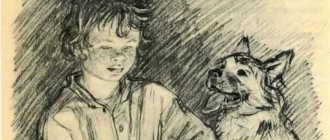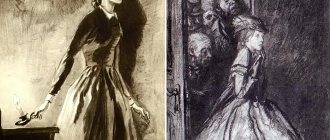The meaning of the image
The author tried to show a person who preaches fatalism as a life position. Bubnov does not strive to appear better. He is cruel and heartless. In the image it is easy to see what happens to people when they lose their human essence. The animal origin becomes clearly visible. Everything that humanity has strived for for many centuries is lost in a matter of days. Civilization, education, culture remain somewhere in the past or behind a wall. The character is passive inside and out. He does not believe in himself and spreads the position of the meaninglessness of life. Everything will disappear, be erased, become dust. Why strive for something? People are superfluous creatures on Earth
The hero's cynical fatalism frightens, but does not confuse the reader. The viewer begins to argue, even the guests of the shelter do not adhere to his position.
Popular writings
- An essay based on the story Children of the Dungeon by Korolenko
“Children of the Dungeon” - this story was written by the writer V. Korolenko quite a long time ago. But reading it, at different times, different people could not remain indifferent. The story tells not only about poverty and indifference, but also about mercy and compassion.
Bubnov is one of the inhabitants of the shelter, a cap-holder who lives there on credit. In the past he was the owner of a dyeing shop. However, his wife got along with the master, after which he chose to leave in order to stay alive. Now he has sunk to the very “bottom” and does not want to retain any positive qualities in himself. According to the play, he is cruel, devoid of compassion and in every possible way shows only his worst sides. Even when dying Anna asks her not to make noise, she replies that noise is not a hindrance to death.
He chose this position deliberately, because he lost faith in the humanity of people. In his opinion, all people are “superfluous”. Bubnov also claims that it is precisely by being at the “bottom” that people show their true nature. All pretense disappears and the person remains “naked.” Thus, he wants to emphasize the animal essence of man. He no longer wants to take into account the development of cultural and social life. He takes a passive position in everything. Bubnov's speeches are full of skepticism and fatalism. He openly admits that he has no conscience, just like he has no money.
Gorky's social drama At the Bottom shows the life of people who find themselves at the very bottom. All the heroes of the work live among various rabble in a shelter. There are thieves, cripples, beggars and wanderers here. They became unnecessary, thrown out of society. Reading the play, you understand that there are no secondary or main characters. Every person here is important and his position is important. Bubnov, whom we will describe in our essay, belongs precisely to this type.
Image and characteristics of Bubnov
To understand the role of Bubnov in the play, you need to get acquainted with the work, where Gorky, in quotes, gives a description of the image he created. From the narrative we know that he was once a furrier, creating products from fur and leather. But his wife has taken a lover, and our hero runs away from sin. After all, at any moment the man could not stand it and kill them both. So Bubnov found himself among other characters in a small basement. For a long time he eked out his existence in this place. Now he is a cap-holder and often lives in debt, including not paying on time for lodging. He is a fatalist and is sure that a person is powerless in the face of circumstances. He can only do one thing, accept the circumstances as they are, which is what the hero of the drama follows. Kartuznik is sure that if fate has written one thing, then there is no point in changing anything, because you cannot avoid what is destined. And he floats with the flow, no matter where it takes him.
By his nature, Bubnov was cruel, without a sense of support and the slightest sympathy. So, in response to a sick neighbor’s request not to make noise, he, without a twinge of conscience, utters cruel words that no noise can prevent her death.
Bubnov is an ordinary, even standard “hero” of his time, of which there were many during the era of writing the play “At the Lower Depths”. Bubnov remained without a name, most likely because he does not position himself in any way in the future.
He calls himself a lazy person and an alcoholic. He realizes that he drinks everything to the last. Lives in the Kostylevs' basement out of charity from the landlady. Bubnov pays the due amount for the night's accommodation slowly, or even does not generate income at all for his existence.
Appearance "at the bottom"
The fate of a man evokes pity only at first. Bubnov had his own craft. It was a furrier's workshop. A master worked for him. Bubnov admits that the employee was talented. He managed to create exotic fur products from the skins of dogs and cats. Does the question immediately arise? What did Bubnov make his furs from? Was his establishment a slaughterhouse? Therefore, perhaps, the subsequent story often causes a smile. The wife fell in love with the master. What did the offended husband do? Beat a woman. A clear example of cynicism and cruelty. How it could end is the answer in the play, in the form of Anna or the hostess’s sister Nastya. Bubnov's wife is stronger in character. The master came to her defense. Vicious fights led to thoughts of murder. Bubnov boasts that he managed to stop in time and did not follow the path of a convict. Or maybe this is cowardice? Weakness brought Bubnov to the shelter and threw him overboard.
Option 2
The famous play “At the Bottom” by Maxim Gorky is a dramatic work that tells about the lives of people who find themselves at the very “bottom” of their lives.
One of the main and quite interesting characters in the play is Mr. Bubnov. He is a mature man, 45 years old, who does not have his own home. He lives in a small shelter for poor people, which is provided by the Korostylevs. Bubnov, in the past, was a furrier. He made leather and fur products. He even once had his own dyeing factory. It is also known that he had a wife, but she betrayed him by cheating on Bubnov with a worker from his workshop. Angry, he beat his wife, and at some point wanted to get rid of her by criminal means, but after thinking about it, he gave up on this idea and simply left. Because of this, he lost everything he had and remained poor. Left without a roof over his head, he began to earn his living by making hats and caps. He lives in a shelter on borrowed time, as there is not enough money to pay.
All his actions and spoken words are imbued with cruelty, cynicism and skepticism towards others. For Bubnov, man is a low, selfish creature. He categorically does not want to believe in the culture and fortitude of the surrounding society. He is a supporter of deceitful and flattering relationships between people, believing that such relationships bring great benefits. In a conversation with his interlocutor, he does not mince words and expresses everything he thinks.
Such denial and pessimism stem from a lack of faith in human kindness, honesty and openness. Bubnov compares people to chips that float on water without a definite direction. A person, having sunk to the “very bottom” of his existence, fully reveals his nature. His like-minded person in the play is the Baron. Bubnov admits that he has no conscience, he is deprived of a sense of compassion, as well as the presence of money. Despite all this, he continues to dream of wealth and a happy life.
Despite his far from old age, Bubnov considers the shelter a shelter where he will spend the rest of his days. He doesn’t want to change anything in his life and refuses the advice of other people.
The image of Bubnov is the image of a weak-willed, weak person who, having found himself in a difficult life situation, refuses the help of others and does not want to try to change something in his life. He simply gives up and hides behind his own weakness and worthlessness.
Bubnov and Luka
Two guests argue about truth and lies. Why does a person lie? Bubnov believes that lying is an attempt to brighten up the soul. It is better to speak only the truth, no matter how cruel it may be. Conscience is also not needed by everyone. The rich should have it, but the poor have no use for it. A man has no respect and awe before death. He responds rudely to the sick woman's request;
“...noise is not a hindrance to death...”
The classic gives the character a sober view of things. He's smart enough. The characterization that comes out of the character’s mouth is often correct and accurate. His heartlessness is frightening. He sees everything, understands, but does not support anyone. What is this? The response to the betrayal of a loved one or the position that led to the betrayal? Everyone chooses their own opinion.
Essay on Bubnov in the story At the Bottom
The character of the hero of M. Gorky’s play “At the Bottom” is not difficult to determine, because the author very accurately describes the images of people who find themselves in difficult life situations and live, so to speak, “at the bottom” of life.
The heroes of the play are housed in Kostylev’s basement, and there you can meet working people, actors, and even nobles who have stopped seeing the prospects and meaning of their lives and are simply putting up with their miserable existence. Among them lives Bubnov, who deserves special attention to his person.
Bubnov has both supporters of his views, such as Baron, and those who do not share his views on life, such as Luka and Satin. Bubnov adheres to the idea that a person is powerless in the face of life’s circumstances, and that if it is destined to end up in a difficult life situation, then it cannot be avoided, but one must come to terms with it. He compares people to chips floating with the current and not knowing where it will take them.
Bubnov is not trying to change anything in his life, he is not striving for anything at all. He is only 45 years old, but he has already decided that his life is over and the basement in which they all live will become his last refuge. He doesn’t even want to listen to anyone when they try to convince him, because he is true to his views. He is very indifferent not only to himself and to his life, but also to the lives of other people, he is not familiar with such feelings as pity and compassion, because when Anna, being near death, asks to speak more quietly, he says that noise cannot interfere her death, and when Anna does die, Bubnov speaks badly of her even then. He believes that a lie should be welcomed if there is at least some benefit in it, he can also tell everyone who lives in the shelter with him to his face what he is like, without embellishing or hiding anything.
However, Bubnov is a dreamer who likes to think about how he would live if he were rich, because he used to own a workshop, albeit a small one. But then, having learned that his wife had taken a lover, who worked as Bubnov’s assistant, he first wanted to take revenge on her, but changed his mind and simply left. And each reader decides for himself what feelings a character like Bubnov evokes in him, whether to feel sorry for him because of his sad fate, or to condemn him for his words and attitude towards people.
Character character
The author calls the hero master. There is a lot of sarcasm and bitterness in the word. Mister - no home, no family, no property. As a result, he is also a person without a future. The furrier's hands were always yellow with paint and became dirty. A man sits on a bunk and tries to cut a hat out of old trousers. A set of torn rags looks ridiculous. It is understandable why the tenant does not pay for the overnight stay. He forgot how to sew. He lives with the Kostylevs “out of mercy”; he can no longer count how much he owes. The gentleman is lazy, “...I don’t like passion for work!”, that’s why he lives on credit.
Another character trait is a love of drinking. He falls into a binge and does not come out of it. It’s interesting that he only becomes like a person when he’s drunk.
The naked bestial essence of man is the core inside everyone. No matter how you embellish your actions or change your appearance, the essence remains. The author does not accept this position of Bubnov. Indifference leads to death, loss of human traits. The desire to live, dream and hope are qualities that cannot be given up when stopping development.
Fate
Before finding himself at the “bottom” of life, Bubnov had his own workshop. The hero was a furrier - a master of making fur and leather products. Moreover, Bubnov not only worked himself, but also had an employee. Ultimately, Bubnov's wife fell in love with the master who worked for him. Bubnov decided that the best way would be to beat his wife. However, the master protected her. And then Bubnov decided to “kill” his wife, but, as the hero admits, he “came to his senses” in time and left. So the hero was left with nothing: alone, without money and without housing.
Bubnov began to live in a shelter for the poor. Now he works as a cap maker, making hats. The work shows that the hero has completely forgotten how to work. Instead of the yellow hands that Bubnov had when he worked as a furrier, he now simply had dirty hands. Now the hero has forgotten how to sew. Therefore, he is in a hole of debt and cannot return all the money that he owes to the hostess of the rooming house.
Characteristics and image of the hero
Bubnov is described as a hostage of fate, who once entered into an unequal battle with her. Once having his own workshop for sewing furs, he earned good money, was married, and was self-sufficient. But his wife’s betrayal with a clever craftsman ruined his life. In addition, the workshop belonged to his wife and after a difficult struggle with assault, Bubnov had to drop everything and go to the basement. The man could not start everything from scratch, rise from his knees. Dropping lower, Bubnov took hold of the bottle. At 45, he saw no point in making life better. Binge drinking is his normal state. As they say in the work, it is when he is drunk that he still remains human.
However, the life he plunged into changes him, turning him into an insensitive person with notes of cruelty. When dying Anna asked for silence, he replied that noise was not an obstacle to death. Showing with all his appearance that he was a bad, soulless and callous person, Bubnov showed his protest to life, which took away from him everything that he had achieved himself. He did not hesitate to list his shortcomings, constantly reminding him that he was bad. Distrust of people, of everyone in society and personal fear of a new betrayal did not allow Bubnov to wake up and emerge from a state of aggression and despondency. As a result, man began to gradually and surely get used to existence, but not to life. It can be noted that this is not the only and far from fictional character in the series of “poor people” of different times and works of great Writers.
People like Bubnov are far from rare. As far as the human factor is concerned, however, nothing changes from century to century. After a blow of fate, falling into depression, people who were once successful in life plunge to the bottom and degrade, although not dramatically. Initially, Bubnov rushes into battle, deciding that he can help the cause with his fists and physical violence. I thought about killing my wife, but changed my mind. He withdrew into himself and there was no support for his suffering. Binge drinking did not teach a person life lessons, did not give him the idea to come to his senses. As a result, going with the flow without a hint of struggle turned out to be much easier than getting out of the mud into which the hero, alas, gradually drove himself on his own.


